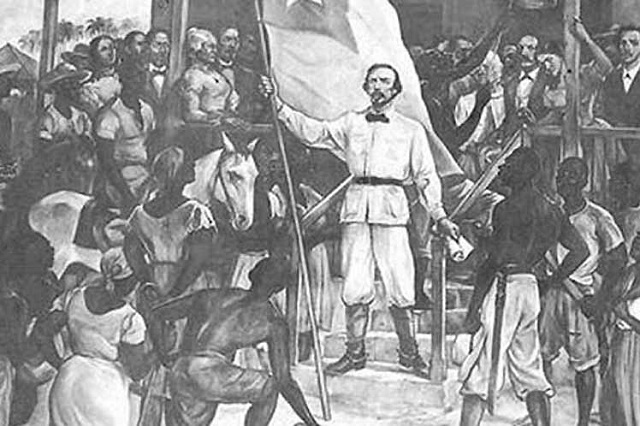Havana, Cuba: Cuba today remembers the armed uprising of October 10, 1868, an event that marked the beginning of the independence process, Prensa Latina publishes.
The president of the Institute of History of Cuba, Yoel Cordoví, commented that this event proposed for the first time that only the armed struggle could resolve the contradictions between the colony and the Metropolis.
“This way arouses an emancipatory process, which is in favor of the abolition of slavery and which helps to forge an idea of ??a great homeland?, he says.
Carlos Manuel de Céspedes (1819-1874), who led a group of conspirators from Manzanillo made the decision to start the war, set his slaves free and invited them to fight for a free Cuba.
Historical data reflect that on that date the slave population amounted to more than 300 thousand men and women, more than 70 percent were in the western region.
Cordoví explains that after that blast on October 10, other uprisings occurred in Camagüey (1868) and Las Villas (1869), in the central-eastern part of the country.
“In the West there were some uprisings, but the presence of the fundamentalist sector, the rapprochement with the political-administrative center of Spain and the location of large slave plantations hindered a radical pronouncement?, he says.
According to the researcher, the experiences apprehended during the following 10 years influenced to achieve a national conception of the war with the invasion from east to west in 1895.
In the opinion of the historian Fabio Fernández, the sharpening of the colony-Metropolis contradictions, economic exploitation, the limitation of political rights and the problem of slavery are factors that led to the outbreak.
The also professor at the University of Havana explained that other international elements influenced the start of the war.
“The political instability in Spain, the anti-Spanish climate in Latin America due to re-colonization projects in the 1860s, as well as the independence outbreak in Puerto Rico are variables to take into account?, he said.
Fernández considers that the date of October 10 is rooted in the thoughts of the inhabitants of Cuba and is part of the network of symbolic representations that define its people. In 1898 the intervention of the United States in the war interrupted the independence process that had begun in 1868.
Historical research agrees that the Republic founded in 1902 under the consent of Washington crippled the emancipatory ideals of armed warfare.
A succession of submissive Cuban governments committed to the interests of the United States led the people to resume the armed struggle until reaching the revolutionary triumph of 1959.

